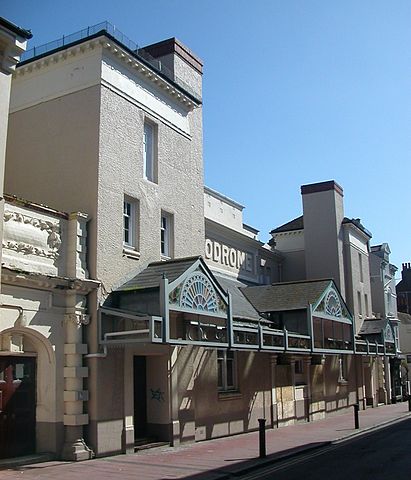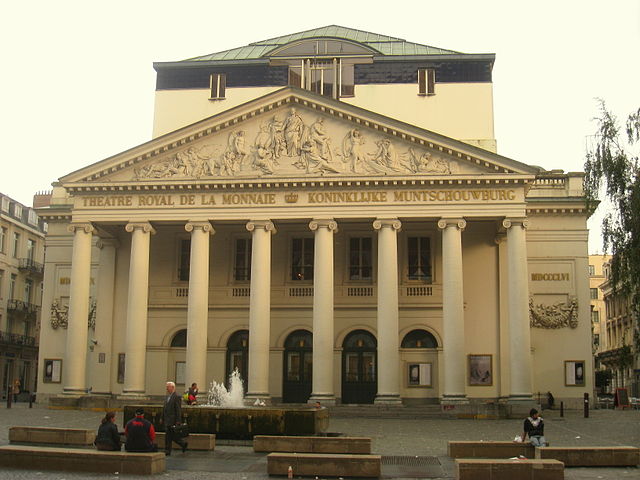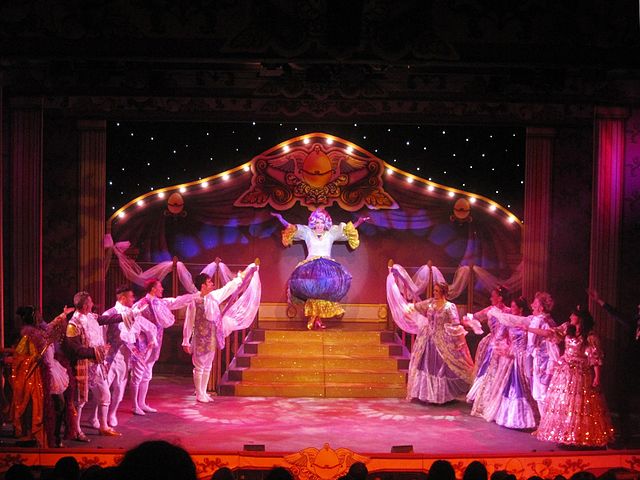 Pop icon Elton John and the theatrical Old Vic Productions have paired up to launch a theatre production company with a particular emphasis on creating original musicals. For fans of the music mogul, this will welcome even further exposure of John’s work, and equally that of musical theatre. Elton John is one of the most talented and influential artists of the generation, and to have him attached to Old Vic Productions is a particular coup. A new family show will be born of the partnership, featuring songs from John’s back catalogue.
Pop icon Elton John and the theatrical Old Vic Productions have paired up to launch a theatre production company with a particular emphasis on creating original musicals. For fans of the music mogul, this will welcome even further exposure of John’s work, and equally that of musical theatre. Elton John is one of the most talented and influential artists of the generation, and to have him attached to Old Vic Productions is a particular coup. A new family show will be born of the partnership, featuring songs from John’s back catalogue.
‘Rocket Stage’ – as it is to be called – is a £10 million joint venture between Old Vic Productions – the co-producer of Billy Elliot the musical, which features music by John – and Rocket Pictures, the entertainment company created by John, David Furnish and Steve Hamilton-Shaw. Old Vic Productions will invest 25% into the company, with the remaining 75% from Rocket Pictures: the company will co-produce a series of shows in association with John, and the joint venture will have the rights to all John’s future musical theatre projects.
Rocket Stage is currently working on five new musicals, one of which will be a family show that will feature existing songs by John, alongside much new material too. The second creation will be a brand new show that will feature an entirely new score from John, demonstrating his talent is very much alive and kicking! Old Vic Productions will therefore co-produce all of the planned stage shows and general manage them in the UK. With so much investment from Old Vic Productions (£2.5million over three years) this will guarantee long term value for Old Vic Productions trough rights and royalties.

 The year-long celebration of song and dance will begin with BalletBoyz: The Talent, documenting the work of dance company BalletBoyz, followed by the BBC Young Dancer 2015 in April with the final in May. In July, David Bintley, Artistic Director of Birmingham Royal Ballet, will investigate how the foundations of ballet were laid during the reign of King Louis XIV of France, in The King Who Invented Ballet. The autumn will focus on the story of contemporary dance told through a group of young dancers in new documentary, Strictly Modern Dance.
The year-long celebration of song and dance will begin with BalletBoyz: The Talent, documenting the work of dance company BalletBoyz, followed by the BBC Young Dancer 2015 in April with the final in May. In July, David Bintley, Artistic Director of Birmingham Royal Ballet, will investigate how the foundations of ballet were laid during the reign of King Louis XIV of France, in The King Who Invented Ballet. The autumn will focus on the story of contemporary dance told through a group of young dancers in new documentary, Strictly Modern Dance. Christine Baranski, Russell Watson and Ruthie Henshall are set to star in a concert production of Stephen Sondheim’s musical Follies at the Royal Albert Hall on 28 April. Directed by Craig Revel Horwood, with choreography by Andrew Wright, the music for the production will be performed by the City of London Philharmonic Orchestra.
Christine Baranski, Russell Watson and Ruthie Henshall are set to star in a concert production of Stephen Sondheim’s musical Follies at the Royal Albert Hall on 28 April. Directed by Craig Revel Horwood, with choreography by Andrew Wright, the music for the production will be performed by the City of London Philharmonic Orchestra. The plans for new multi-screen Brighton cinema have made a hasty retreat after the developer made a swift turnaround on the plan to use a historic venue. Campaigners are now celebrating the dismissal of the plans, which aimed to convert the historic Brighton Hippodrome into a multi-screen cinema and shops.
The plans for new multi-screen Brighton cinema have made a hasty retreat after the developer made a swift turnaround on the plan to use a historic venue. Campaigners are now celebrating the dismissal of the plans, which aimed to convert the historic Brighton Hippodrome into a multi-screen cinema and shops. Andrew Lloyd Webber’s new musical – School of Rock – is set to open on Broadway in December this year, great news for fans of the film of the same name. Based on the 2003 film, the musical will feature songs from it also, in addition to new music by Lloyd Webber. Previously the mogul had spoken about opening the musical on Broadway, rather than in the UK’s because of the more relaxed child performance rules.
Andrew Lloyd Webber’s new musical – School of Rock – is set to open on Broadway in December this year, great news for fans of the film of the same name. Based on the 2003 film, the musical will feature songs from it also, in addition to new music by Lloyd Webber. Previously the mogul had spoken about opening the musical on Broadway, rather than in the UK’s because of the more relaxed child performance rules. Theatre is renowned for providing an escape from the mundane everyday, by transporting audiences into a story which is nothing like their own. Stories of theatre can contain anything from the sublime to the ridiculous, but either way they are travel machines away from the world outside the theatre door. For much of the time, theatre creates an illusion for its audiences in which what is performed on stage becomes real in the minds of the audience.
Theatre is renowned for providing an escape from the mundane everyday, by transporting audiences into a story which is nothing like their own. Stories of theatre can contain anything from the sublime to the ridiculous, but either way they are travel machines away from the world outside the theatre door. For much of the time, theatre creates an illusion for its audiences in which what is performed on stage becomes real in the minds of the audience. In December there was the controversial announcement that the Théâtre Royal de la Monnaie, the most important opera house in Belgium and a source of some of Europe’s most cutting-edge productions, may stop all dance programming after a forthcoming production by iconic Belgian choreographer Anne Teresa De Keersmaeker.
In December there was the controversial announcement that the Théâtre Royal de la Monnaie, the most important opera house in Belgium and a source of some of Europe’s most cutting-edge productions, may stop all dance programming after a forthcoming production by iconic Belgian choreographer Anne Teresa De Keersmaeker. Pantomime has received a facelift in recent years, a “rags to riches” transformation. The 80s and 90s saw a gradual decline in quality, and pantomime was regarded as a cheap entertainment option with some glitter to cover the cracks. Some of regional repertories and smaller companies kept the magic alive and reinvigorated it, however audiences began to demand better and slowly pantomime began to improve.
Pantomime has received a facelift in recent years, a “rags to riches” transformation. The 80s and 90s saw a gradual decline in quality, and pantomime was regarded as a cheap entertainment option with some glitter to cover the cracks. Some of regional repertories and smaller companies kept the magic alive and reinvigorated it, however audiences began to demand better and slowly pantomime began to improve. It has been rumoured that West End star Kerry Ellis is set to take over the role of Grizabella from pop princess Nicole Scherzinger in Cats at the London Palladium in 2015, a huge theatrical coup for musical theatre fans. Scherzinger has previously received mixed reactions from musical theatre-goers however for many, the most important aspect of the news is that Cats will most likely be extending further than it’s previously advertised 12 week run.
It has been rumoured that West End star Kerry Ellis is set to take over the role of Grizabella from pop princess Nicole Scherzinger in Cats at the London Palladium in 2015, a huge theatrical coup for musical theatre fans. Scherzinger has previously received mixed reactions from musical theatre-goers however for many, the most important aspect of the news is that Cats will most likely be extending further than it’s previously advertised 12 week run. It has been revealed that Imelda Staunton will reprise her role as the iconic Momma Rose in Chichester Festival Theatre’s hit production of Gypsy when it transfers to the West End for a strictly limited season in spring 2015. This will be the first London production of Stephen Sondheim’s much-loved musical for more than 40 years, playing at the Savoy Theatre from 28 March.
It has been revealed that Imelda Staunton will reprise her role as the iconic Momma Rose in Chichester Festival Theatre’s hit production of Gypsy when it transfers to the West End for a strictly limited season in spring 2015. This will be the first London production of Stephen Sondheim’s much-loved musical for more than 40 years, playing at the Savoy Theatre from 28 March.